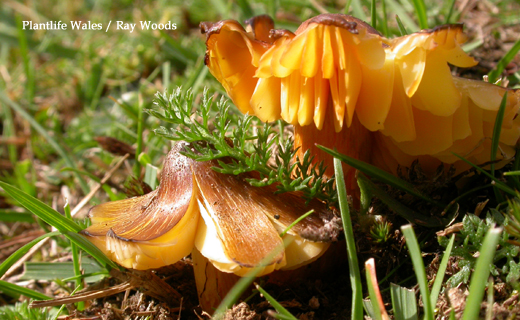Global: World's first society for fungal conservation
02.09.10
A group of scientists that met at the Royal Botanic Gardens, Edinburgh (RBGE) recently have inaugurated the world’s first society for the conservation of fungi.
Following the appointment of a steering group, the International Society for Fungal Conservation aims of creating fresh awareness about the importance of fungi.

"Although often confused with plants, fungi are in fact something totally different: a biological kingdom of their own," explained RBGE Associate Research Mycologist Dr. David Minter, who was responsible for bringing together the 50 leading scientists in Edinburgh on 6 August.
“Where plants are the primary producers, and animals the consumers, fungi are nature’s recyclers par excellence. As such, their ecological role is phenomenally important. It is no exaggeration to say that, without fungi, life as we know it on this planet - and that includes us - could not exist. It is all the more remarkable, therefore, that up to now there has not been a single society in the world explicitly devoted to protecting fungi. The reasons are not hard to find. Being so accustomed to thinking of nature as “fauna and flora”, people overlook fungi. Yet there are more fungi than plants, and far, far more than all the amphibians, birds, fish, mammals and reptiles put together”.
Unlike animals and plants, these economically important and beautiful organisms have no legal protection in most countries of the world. “Even the 1992 Rio Convention on Biological Diversity, which promised so much, has almost totally failed to deliver protection for fungi, making them what some scientists to refer to as ‘the orphans of Rio,’” Dr. Minter continued.
“Fungi have no special features making them immune to destructive human activity. Habitat loss, climate change and pollution imperil fungi just as much as they do animals and plants. The difference up to now has been the absence of voices raised on behalf of fungi”.
That situation is set to change following the launch of the International Society for Fungal Conservation. “Fungi are far more important to human life than we imagine”, concluded Dr. Minter. They are much more than just mushrooms on a plate – there is a desperate need for more research. There is still so much to be learned from fungi. They’ve been overlooked, they need protection, and it’s time to do something about it. We cannot afford to wait any longer”.
The International Society for Fungal Conservation was inaugurated at RBGE with the support of its Director of Science, Professor Mary Gibby, who aidd: “I am delighted to support this initiative to develop the world’s first society for fungal conservation. Fungi are important to all our lives, not just providing us with bread, beer and essential medicines, but fundamental to the functioning of our green planet.
“Fungi are the great recyclers – the ‘rotting fungi’ break down dead and decaying matter while other fungi are intimately associated with roots, ensuring that our forest trees can absorb essential nutrients. And fungi can be extraordinarily beautiful. Through the Convention on Biological Diversity (CBD), great strides have been made for conservation; I hope that this initiative will ensure that the international enthusiasm that has supported plant and animal conservation will be harnessed for fungi.”
RBGE Regius Keeper, Professor Stephen Blackmore, added: “The world wouldn't work without fungi. They complete the natural cycles that plants begin. Focusing on their conservation is long overdue".
According to BGCI the next focus of the International Society for Fungal Conservation will be to adopt a formal constitution and map out its initial objectives by October 22.
UK: Unusual fungus found in bamboo plant
18.08.10
![]() A rare species of fungi, which smells of rotting flesh and usually found in much more southerly climes, has been found by a resident near Oundle in Northamptonshire, England.
A rare species of fungi, which smells of rotting flesh and usually found in much more southerly climes, has been found by a resident near Oundle in Northamptonshire, England.
UK: Lower plant strategy for Wales
09.09.09
 The mosses, lichens and liverworts - collectively known as lower plants - in alliance with fungi (and those who study them!) are the unsung heroes of natural history. So a new strategy produced by the wild plant charity Plantlife in conjunction with Plant Link Cymru comes as good news for fans of these strange beings.
The mosses, lichens and liverworts - collectively known as lower plants - in alliance with fungi (and those who study them!) are the unsung heroes of natural history. So a new strategy produced by the wild plant charity Plantlife in conjunction with Plant Link Cymru comes as good news for fans of these strange beings.